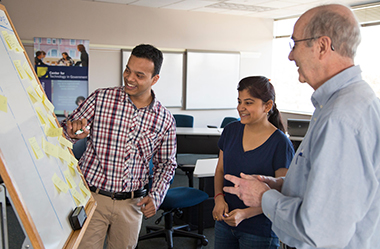CEAS Students Enhancing Shared Services, Open Government
Four computer science master’s candidates form team to enhance electronic records management systems.
 |
|
CEAS master's degree students Rahul Srivastava (left) and Reena Sharma work at the Center for Technology in Government with Web Application Developer Jim Costello. (Photo by Carlo de Jesus)
|
ALBANY, N.Y. (March 7, 2016) — Students from the College of Engineering and Applied Sciences (CEAS) are supporting small and medium-sized local governments throughout New York to comply more easily with records management laws, increase public records access for citizens, and be more open.
Computer science master’s degree candidates Sneha Jain, Reena Sharma, Rahul Srivastava, and Lalitkumar Borse are making these contributions as part of their internships with UAlbany’s Center for Technology in Government (CTG).
The students, working in conjunction with CTG and its partner, Digital Towpath (DTP), a nationally recognized digital-government shared service comprising NYS local governments, are analyzing and making enhancements to DTP’s electronic records management system (ERMS). The project is supported by the state’s Archives’ Local Government Records Management Improvement Fund.
The goal of their work is to address the challenges many member governments face in managing records created in digital form. Currently, the majority are forced to rely on paper records and manual processes which consumes staff time, slows operations, increases costs, and ultimately affects citizens’ ability to access government services and information.
The students are working closely with CTG’s Director of Technology Innovation Derek Werthmuller. “The students hit the ground running, and showed experience using the technology with lots of enthusiasm," said Werthmuller. “They are using an agile software development technique called the SCRUM method, which entails working together as a team to achieve a common goal. They are naturals at this type of teamwork.”
Experiential learning opportunities, such as assisting with the code mapping component of this project, are designed to have lasting effects on students’ professional futures by providing real-world, practical experience to supplement their classroom education.
"This experience represents the best of the experiential or applied learning concept,” noted CEAS Interim Dean Kim Boyer. “Our students, who were obviously well prepared, gained valuable experience beyond the classroom as they developed novel solutions to real problems. And the benefits to small and medium-sized governments, for whom skilled technical expertise is at a premium, can be profound for their operations and their citizens.”
The students’ efforts, according to a DTP report, “will allow increased use of the ERMS anticipated with the introduction of those enhancements
“Being a part of this project team with CTG is providing a foundation for my career,” said Rahul. “I’m gaining a lot of experience using technologies that are becoming more popular and that I know I’ll have to use in the future.”
Reena was equally appreciative, saying “This internship is a breakthrough for my professional career in the IT industry.”
CTG recognizes that new and improved technology alone is not enough to be truly transformative. In addition to the students’ work with the ERMS system, CTG will work with DTP and its member governments to take a comprehensive look at their government information by addressing the policies and management practices that will help them to be more transparent and open.
“The records that this project addresses are valuable public resources that are critical to the running of government and the provision of core services to communities,” said Werthmuller.
![]() For more news, subscribe to UAlbany's RSS headline feeds
For more news, subscribe to UAlbany's RSS headline feeds
A comprehensive public research university, the University at Albany-SUNY offers more than 120 undergraduate majors and minors and 125 master's, doctoral and graduate certificate programs. UAlbany is a leader among all New York State colleges and universities in such diverse fields as atmospheric and environmental sciences, business, education, public health,health sciences, criminal justice, emergency preparedness, engineering and applied sciences, informatics, public administration, social welfare and sociology, taught by an extensive roster of faculty experts. It also offers expanded academic and research opportunities for students through an affiliation with Albany Law School. With a curriculum enhanced by 600 study-abroad opportunities, UAlbany launches great careers.


